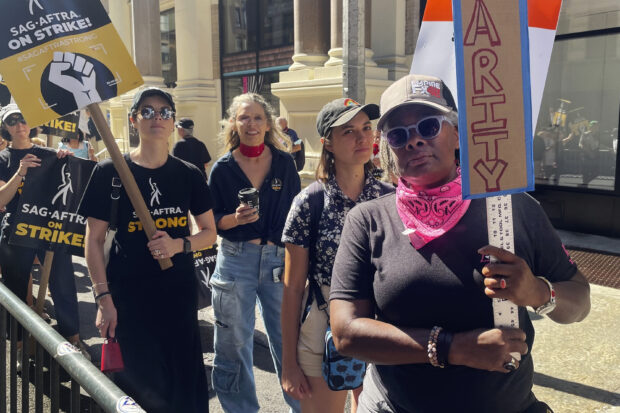Shawn Batey, a member of the International Alliance of Theatrical Stage Employees, took to the picket line outside Netflix’s New York offices on the 100th day of the writers’ strike. Despite the sweltering August sun, Batey was grateful to be there. As a props assistant and documentary filmmaker, she is part of the union that represents entertainment workers like herself in Hollywood, New York, and across the country. Batey has recently worked on popular shows like “Pose” and “Russian Doll,” but since the start of the strike, she has struggled to cover her expenses. In her time of need, she applied for assistance from the Entertainment Community Fund, a nonprofit that supports workers in the entertainment industry.
To be eligible for help, Batey had to provide her union card, wage information, and evidence of her years of union membership. Though the application process was lengthy, she encourages others to apply, emphasizing the importance of patience. Batey herself was able to use the grant she received from the fund to pay her rent, phone bill, electric bill, and other expenses. She is just one of the 2,600 film and television workers who have received aid from the Entertainment Community Fund during these strikes. As of August 25th, the fund has granted a total of $5.4 million. It primarily receives requests for assistance from individuals in California, followed by Atlanta and New York. Currently, the fund is providing one-time grants of up to $2,000 for individuals and $3,000 for families.
The fund’s history goes back many years, as it has supported entertainment industry workers through previous crises such as the AIDS epidemic and financial downturns. The Motion Picture & Television Fund (MPTF), another charity established over a century ago, helps administer funds from unions to provide emergency assistance to their members. While the exact amount of financial support MPTF receives from unions is undisclosed, the organization also offers support to unaffiliated workers and housing for industry veterans over 70 years old. According to Bob Beitcher, the president and CEO of MPTF, many of the lowest-paid entertainment workers lack savings or reserves since the pandemic. The federal programs that provided some support during COVID-19 shutdowns, including eviction moratoriums, are no longer in place. As a result, these workers are facing the loss of their homes, vehicles, and health insurance.
The strike has taken a toll on the livelihoods of unionized entertainment workers, leading to an increase in calls to MPTF for assistance – from 20 calls a day prior to the strike to 200 calls a day currently. Over 80% of these calls are from “below-the-line” workers, meaning those who are not actors, writers, directors, or producers. MPTF has processed 1,000 requests for financial aid by the end of July, with an average waiting time of two weeks before funds are dispersed. In an open letter on August 17th, Beitcher called for greater support from the industry, emphasizing the need to assist crew members and others who rely on the entertainment industry for their livelihoods.
The SAG-AFTRA Foundation, a nonprofit dedicated to supporting members of the actors’ union, has raised $15 million during the actors’ strike. The foundation received initial donations of $1 million or more from celebrities like Dwayne Johnson, Meryl Streep, George and Amal Clooney, and many others. Cyd Wilson, the executive director of the foundation, stressed that smaller actors who live paycheck to paycheck are the ones most in need of help. Among the union’s 160,000 members, 86% do not earn enough work in a year to qualify for health insurance. These actors often hold multiple secondary jobs, such as waitressing, bartending, and driving for services like Uber, in order to make ends meet.
As the strike continues, the funds anticipate that more union members will lose their health insurance due to not working enough hours. A group of showrunners has set up a fund in partnership with MPTF to specifically raise money for crew members’ healthcare. Additionally, several actors, including Lena Dunham, Paul Scheer, and Andrea Savage, founded The Union Solidarity Coalition to raise funds for the strike-affected workers. Celebrities have already contributed, and events like benefit shows and auctions have been organized to gather resources. Batey, who has received assistance but is still uncertain about her future during the strike, remains committed to supporting her fellow workers. She sees the strike as a means of standing up for dignity and believes that taking a hit now is worth it for the larger cause.
Denial of responsibility! VigourTimes is an automatic aggregator of Global media. In each content, the hyperlink to the primary source is specified. All trademarks belong to their rightful owners, and all materials to their authors. For any complaint, please reach us at – [email protected]. We will take necessary action within 24 hours.


